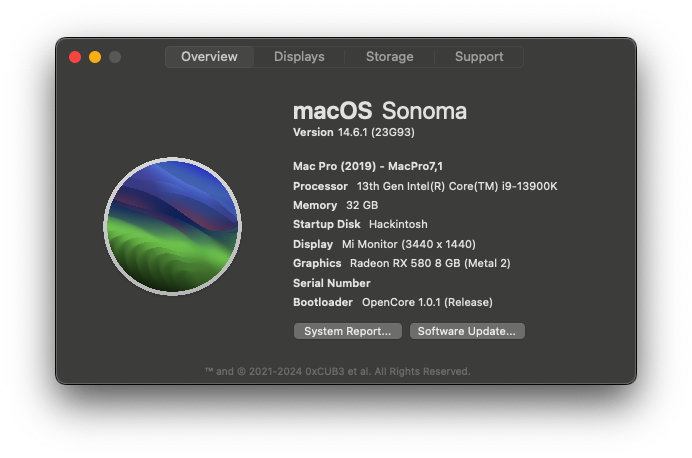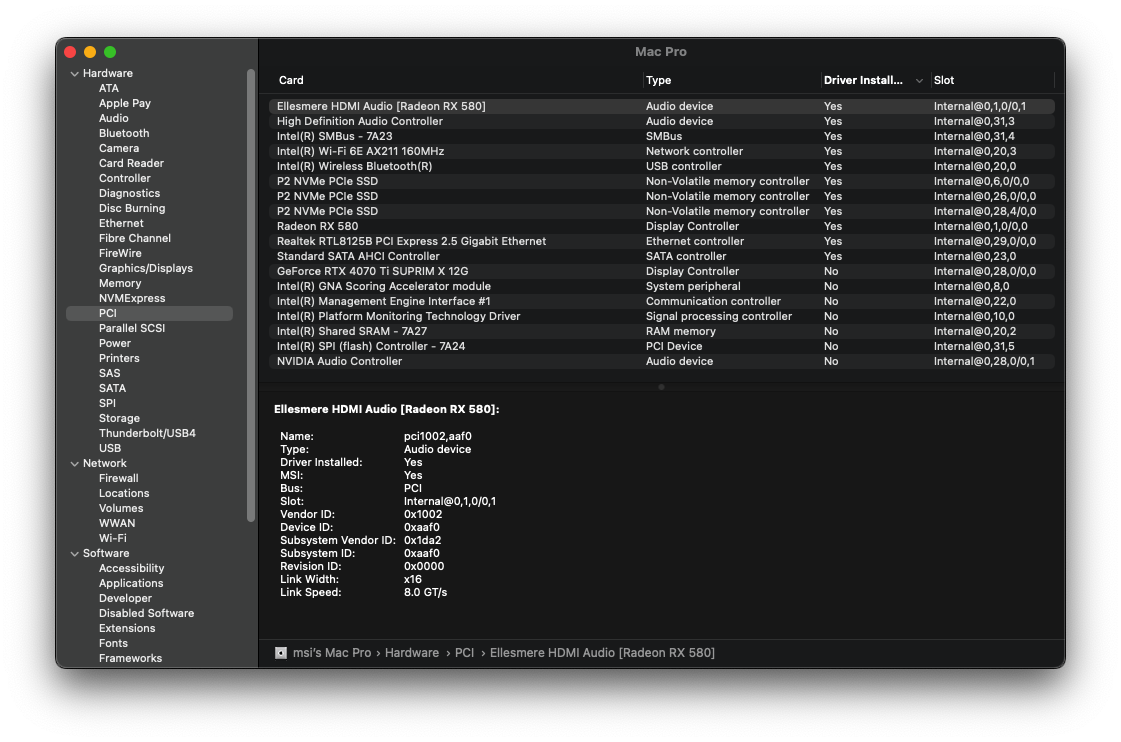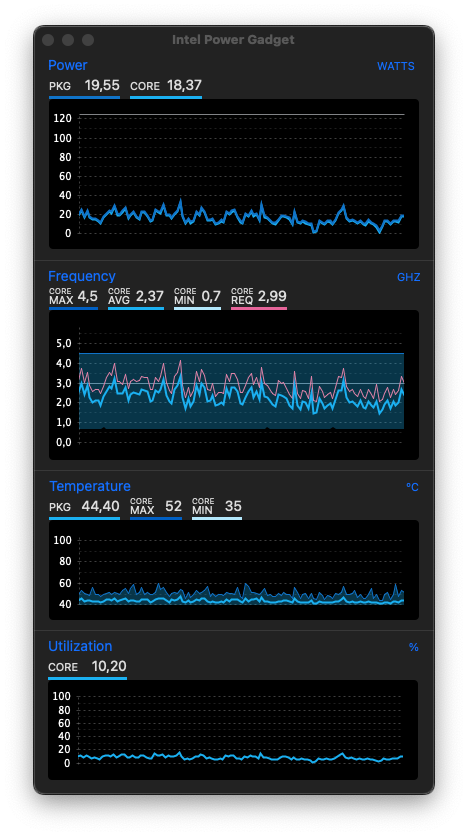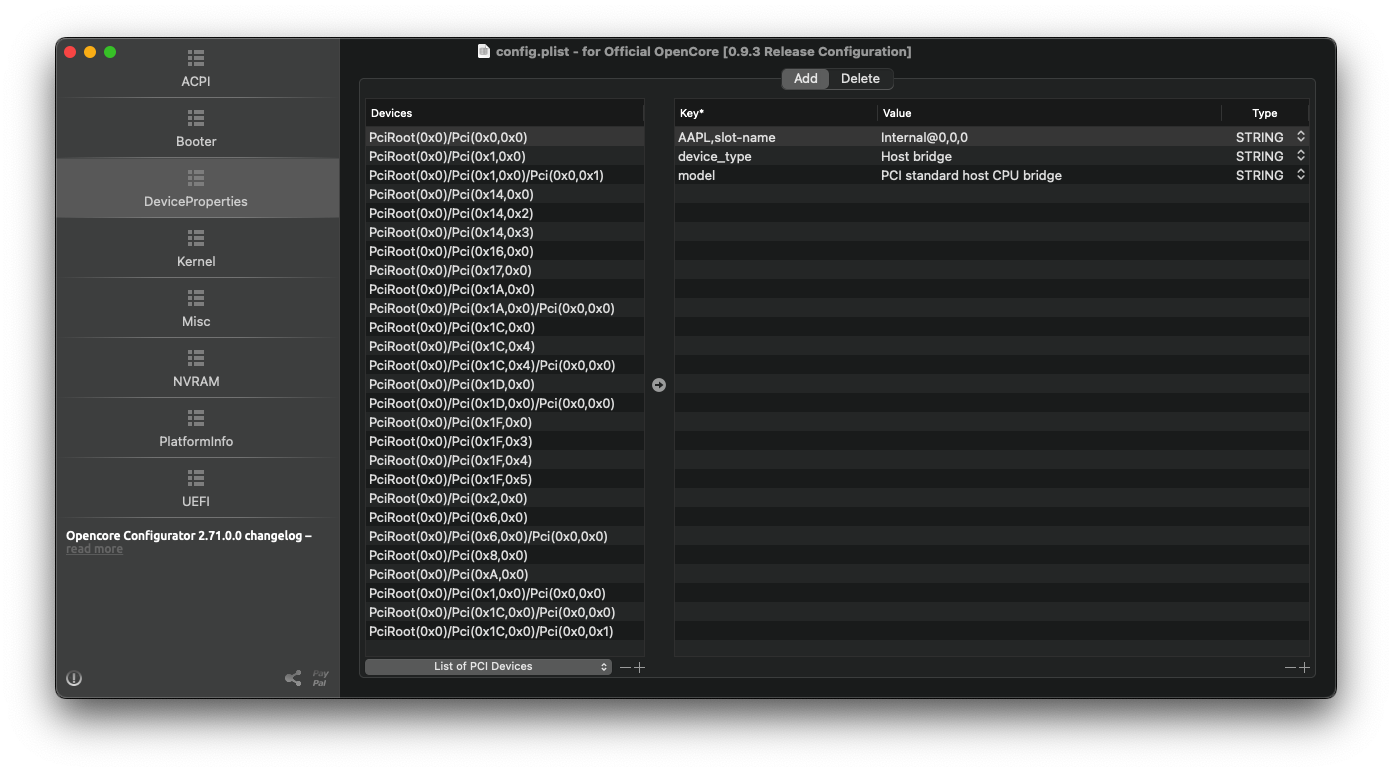https://github.com/arg0wak/hackintosh-uefi-msi-b760-13900k
This repo contains configuration and bootloader files that fully support macOS 12.6.5 Monterey - Ventura & Sonoma 14.0 (23A344) with on MSI B760 motherboard and 13900k processor.
https://github.com/arg0wak/hackintosh-uefi-msi-b760-13900k
b760 bios-settings efi guide hackintosh i9-13900k monterey msi opencore opencore-configuration rx580 sonoma ventura
Last synced: 3 months ago
JSON representation
This repo contains configuration and bootloader files that fully support macOS 12.6.5 Monterey - Ventura & Sonoma 14.0 (23A344) with on MSI B760 motherboard and 13900k processor.
- Host: GitHub
- URL: https://github.com/arg0wak/hackintosh-uefi-msi-b760-13900k
- Owner: arg0WAK
- License: mit
- Created: 2023-06-26T19:36:52.000Z (almost 2 years ago)
- Default Branch: main
- Last Pushed: 2024-09-10T19:51:58.000Z (9 months ago)
- Last Synced: 2024-09-10T22:08:46.609Z (9 months ago)
- Topics: b760, bios-settings, efi, guide, hackintosh, i9-13900k, monterey, msi, opencore, opencore-configuration, rx580, sonoma, ventura
- Homepage: https://arg0wak.github.io/Hackintosh-UEFI-MSI-B760-13900K/
- Size: 63.5 KB
- Stars: 12
- Watchers: 3
- Forks: 0
- Open Issues: 0
-
Metadata Files:
- Readme: README.md
- Funding: .github/FUNDING.yml
- License: LICENSE
Awesome Lists containing this project
README
Hackintosh-UEFI-MSI-B760-13900K
This repo contains configuration and bootloader files that fully support macOS 14.6.1 Sonoma (23G93) with on MSI B760 motherboard and 13900k processor.

1. Preparation
1.1 Environment:
![]()
Device
![]()
Working
13th Gen Intel(R) Core(TM) i9-13900K
✅ WITH O.C. MODE
G.Skill Trident Z5 RGB 32 GB (2x16) 6000 MHz DDR5
✅ WITH XMP MODE
iCUE H150i ELITE LCD XT Display Liquid CPU Cooler
✅
Intel(R) Wireless Bluetooth(R)
✅
Intel(R) Wi-Fi 6E AX211 160MHz
✅
RTL8125 2.5GbE Controller
✅
High Definition Audio Controller
✅
Intel(R) SMBus - 7A23
✅
Ellesmare Sapphire RX 580 8GB
✅
Intel(R) Shared SRAM - 7A27
❌
GeForce RTX 4070 Ti SUPRIM X 12G
❌ DISABLED WITH SSDT PATCH
Intel Raptor Lake-S GT1 [UHD Graphics 770]
❌ DISABLED WITH SSDT PATCH

1.2 BIOS
![]()
Property
![]()
Status
Secure Boot
Disabled
Fast Boot
Disabled
MSI Fast Boot
Disabled
Re-Size BAR Support
Disabled
Initiate Graphic Adapter
[PEG]
Integrated Graphics Share Memory
[64M]
IGD Multi Monitor
Enabled
Discrete Thunderbolt(TM) Support
Disabled
XHCI Hand-Off
Enabled
Legacy USB Support
Enabled
BIOS CSM/UEFI Mode
[UEFI]
Above 4G Memory
Enabled
2. ACPI (Advanced Configuration and Power Interface)
2.1 Introduction
Advanced Configuration and Power Interface (ACPI) specification was developed
to establish industry common interfaces enabling robust operating system
(OS)-directed motherboard device configuration and power management of both
devices and entire systems.
The pseudo-code language, known as ACPI Machine Language (AML), is a compact,
tokenized, abstract type of machine language.
If you want see more than about for ACPI you can check that:
UEFI.ORG
DSDT's & SSDT's are tables present in your firmware that outline hardware
devices like USB controllers, CPU threads, embedded controllers, system clocks
and such. A DSDT(Differentiated System Description Table) can be seen as the
body holding most of the info with smaller bits of info being passed by the
SSDT(Secondary System Description Table).
The following items are required for motherboards later B300 series
- ACPI/SSDT-EC-USBX.aml
- ACPI/SSDT-AWAC.aml
- ACPI/SSDT-RHUB.aml
- SSDT-SBUS-MCHC.aml (FOR SMBUS)
- ACPU/SSDT-GPU-DISABLE.aml (ONLY FOR RTX 4000 SERIES USERS)
Below are also the configurations that should be used for USB port processes
on the MSI B760 motherboard. If you are going to install directly on the same
model, you can use the USBMap.kext file defined in the configuration file and
the SSDT-EC-USBX.aml configuration. If you are trying to install on a
different motherboard, please make sure you have mapped to your motherboard
model. Before proceeding, make sure your power management is properly
configured and XCPM is installed. For detailed information see:
(Don't forget! All Mac hardware only has 15 USB ports.)
2.2 Kexts (Kernel Extensions)
The so-called kernel extension file is actually what we usually call a driver.
The following two drivers are required
Kexts/VirtualSMC.kext
Kexts/Lilu.kext
The following two drivers are used to monitor CPU temperature and fan speed.
They are suitable for both desktop and laptop computers, but can only be used
under Intel CPUs.
Kexts/SMCProcessor.kext
Kexts/SMCSuperIO.kext
The driver above is the using for monitoring Intel CPU temperature driver. Its
stable operation depends on having XCPM installed.
Kexts/CPUFriend.kext This kernel extension is produced with the
CPUFriend.command file. After performing all power management operations in
order, you should check the operating frequency range of your processor with
this kext. CPUFriendDataProvider is a subpath of this kext. Don't
change the order.
Default Value equal is 2.50-3.00 GHz Core AVG
For more information about CPUFriend, visit this link.
CPUFriend on Github

Kexts/RestrictEvents.kext The following driver is for CPUName
Commander.
Kexts/WhateverGreen.kext The following driver is a sound card
driver that supports most onboard sound card drivers.
Kexts/AppleALC.kext AppleALC is a kernel extension that will
provide native support to your audio driver. If you have a B760 motherboard,
do not change the configuration in the config.plist file. Otherwise try using
different layout-ids.
Check here to view supported codecs.
Audio Layout ID's
Kexts/USBInjectAll.kext
RehabMan OS-X-USB-Inject-All
If you are using a different motherboard model, implement this instead of
USBMap.kext. Then provide your mapping according to the guide
mentioned above. If you don't you can download latest version of
USBInjectAll.kext.
Kexts/AirportItlwm.kext
Kexts/IntelBluetoothFirmware.kext Check
OpenIntelWireless
2.3 PCI-Root Locations

The PCI location paths of the components on your motherboard may differ from the
paths in the config.plist in the repository you pulled. For the most accurate
PCI root location path mapping, you can get help from the Device Manager page in
your system's Windows operating system, if available. Alternatively, you can try
export log output of PCI Devices via
OpenShell.efi.
For this reason you may sure completely deleted all PCI devices on
config.plist files.
If you are using OpenShell, make sure that the log you have obtained is as
follows.
Mapping table
FS8: Alias(s):HD2b:;BLK13:
PciRoot(0x0)/Pci(0x6,0x0)/Pci(0x0,0x0)/NVMe(0x1,14-01-00-C0-6B-A7-79-64)/HD(1,GPT,3A38FD13-4F67-4DDF-BEAA-60904393A700,0x800,0x32000)
FS9: Alias(s):HD2d:;BLK15:
PciRoot(0x0)/Pci(0x6,0x0)/Pci(0x0,0x0)/NVMe(0x1,14-01-00-C0-6B-A7-79-64)/HD(3,GPT,39567AA6-AFDA-4912-B515-D054469F6EA2,0x3A800,0x74594498)
FS10: Alias(s):HD2e:;BLK16:
PciRoot(0x0)/Pci(0x6,0x0)/Pci(0x0,0x0)/NVMe(0x1,14-01-00-C0-6B-A7-79-64)/HD(4,GPT,59AFA98E-F8EF-4EAB-A14F-EF25476A9493,0x745CF000,0x136800)
FS0: Alias(s):HD0c:;BLK2:
PciRoot(0x0)/Pci(0x1A,0x0)/Pci(0x0,0x0)/NVMe(0x1,A6-03-00-C0-6B-A7-79-64)/HD(2,GPT,3C500731-5D7E-4600-A472-B3050B66F1B2,0x8000,0x746FE000)
FS1: Alias(s):HD1b:;BLK4:
PciRoot(0x0)/Pci(0x1C,0x4)/Pci(0x0,0x0)/NVMe(0x1,22-01-00-C0-6B-A7-79-64)/HD(1,GPT,A11C6869-6ED1-47E8-B664-38877382C917,0x28,0x64000)
FS5: Alias(s):HD1c:;BLK9:
PciRoot(0x0)/Pci(0x1C,0x4)/Pci(0x0,0x0)/NVMe(0x1,22-01-00-C0-6B-A7-79-64)/HD(2,GPT,47447AD3-B50A-4D81-96CF-A73CE50F4022,0x64028,0x746A2D60)/VenMedia(BE74FCF7-0B7C-49F3-9147-01F4042E6842,68202B482DACBB4A8C5EA6963C5E6994)
FS7: Alias(s):HD1c:;BLK11:
PciRoot(0x0)/Pci(0x1C,0x4)/Pci(0x0,0x0)/NVMe(0x1,22-01-00-C0-6B-A7-79-64)/HD(2,GPT,47447AD3-B50A-4D81-96CF-A73CE50F4022,0x64028,0x746A2D60)/VenMedia(BE74FCF7-0B7C-49F3-9147-01F4042E6842,B9E14ADAF3BD044BB5C0D6D46812A156)
FS3: Alias(s):HD1c:;BLK7:
PciRoot(0x0)/Pci(0x1C,0x4)/Pci(0x0,0x0)/NVMe(0x1,22-01-00-C0-6B-A7-79-64)/HD(2,GPT,47447AD3-B50A-4D81-96CF-A73CE50F4022,0x64028,0x746A2D60)/VenMedia(BE74FCF7-0B7C-49F3-9147-01F4042E6842,51959A5C2C44F441BAD1049C94321665)
FS6: Alias(s):HD1c:;BLK10:
PciRoot(0x0)/Pci(0x1C,0x4)/Pci(0x0,0x0)/NVMe(0x1,22-01-00-C0-6B-A7-79-64)/HD(2,GPT,47447AD3-B50A-4D81-96CF-A73CE50F4022,0x64028,0x746A2D60)/VenMedia(BE74FCF7-0B7C-49F3-9147-01F4042E6842,98E80C70DCC23343AC6ECB0FEDB4E659)
FS4: Alias(s):HD1c:;BLK8:
PciRoot(0x0)/Pci(0x1C,0x4)/Pci(0x0,0x0)/NVMe(0x1,22-01-00-C0-6B-A7-79-64)/HD(2,GPT,47447AD3-B50A-4D81-96CF-A73CE50F4022,0x64028,0x746A2D60)/VenMedia(BE74FCF7-0B7C-49F3-9147-01F4042E6842,6286A1009BA9BB40BBA7E9BABA9600A3)
FS2: Alias(s):HD1c:;BLK6:
PciRoot(0x0)/Pci(0x1C,0x4)/Pci(0x0,0x0)/NVMe(0x1,22-01-00-C0-6B-A7-79-64)/HD(2,GPT,47447AD3-B50A-4D81-96CF-A73CE50F4022,0x64028,0x746A2D60)/VenMedia(BE74FCF7-0B7C-49F3-9147-01F4042E6842,477EC8866153A44F99B35F6B80A0AF03)
BLK12: Alias(s):
PciRoot(0x0)/Pci(0x6,0x0)/Pci(0x0,0x0)/NVMe(0x1,14-01-00-C0-6B-A7-79-64)
BLK14: Alias(s):
PciRoot(0x0)/Pci(0x6,0x0)/Pci(0x0,0x0)/NVMe(0x1,14-01-00-C0-6B-A7-79-64)/HD(2,GPT,A02AF1EB-B559-414E-9A2A-87A0F382A8E6,0x32800,0x8000)
BLK0: Alias(s):
PciRoot(0x0)/Pci(0x1A,0x0)/Pci(0x0,0x0)/NVMe(0x1,A6-03-00-C0-6B-A7-79-64)
BLK1: Alias(s):
PciRoot(0x0)/Pci(0x1A,0x0)/Pci(0x0,0x0)/NVMe(0x1,A6-03-00-C0-6B-A7-79-64)/HD(1,GPT,552608A5-29A7-49AF-8D18-CA76D7BBBA8E,0x22,0x7FDE)
BLK3: Alias(s):
PciRoot(0x0)/Pci(0x1C,0x4)/Pci(0x0,0x0)/NVMe(0x1,22-01-00-C0-6B-A7-79-64)
BLK5: Alias(s):
PciRoot(0x0)/Pci(0x1C,0x4)/Pci(0x0,0x0)/NVMe(0x1,22-01-00-C0-6B-A7-79-64)/HD(2,GPT,47447AD3-B50A-4D81-96CF-A73CE50F4022,0x64028,0x746A2D60)
3. SMBIOS
All SMBIOS information in config file has been removed for security. Please
use the GenSMBIOS tool to obtain an appropriate SMBIOS output for your system.
Since the Intel i9-13900k is not natively supported on macOS, it must be
emulated to the 10th Gen. At this point, make sure that the output you receive
from GenSMBIOS emulates the following device types.
- iMacPro1,1.
- MacPro7.1
4. Benchmark Results
RX580 Benchmark on GeekBench 6
i9-13900k Benchmark on GeekBench 6
IMPORTANT: The i9-13900k test results give lower values
compared to the results of a 13900k running at full performance. This is due
to the fact that the processor is not run at full speed in line with user
preference. Overclock your CPUFriend settings for truly satisfying results.
Enjoy it.